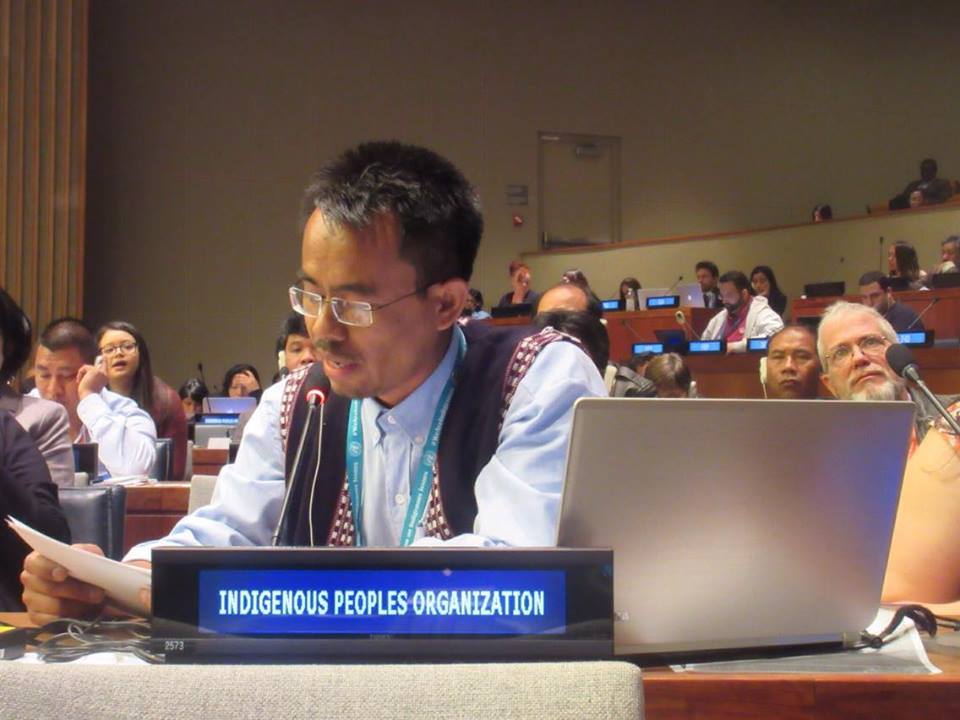
IMPHAL, May 18: Jiten Yumnam has raised the issue of prolonged imposition of the Armed Forces Special Powers Act (AFSPA) at the UN Indigenous meet in New York, according to press release issued by Centre for Research and Advocacy, Manipur (CRAM).
Jiten is presently attending the 15th session of the UN Permanent Forum on Indigenous Issues (PFII) held at the UN Headquarters in New York which began on May 9.
Jiten Yumnam is the Secretary of the Centre for Research and Advocacy, Manipur (CRAM) and a member of the Civil Society Coalition on Human Rights in Manipur and the United Nations.
Jiten intervened on two agenda items of PFII, Agenda Item 4 that deals with the implementation of Six thematic areas of the PFII and also on Agenda Item 5, Interactive Dialogue on “Indigenous Peoples: Conflict, Peace and Resolution”.
He also made submissions on Agenda 3, i.e, implementation of outcome of World Conference on Indigenous Peoples.
Jiten Yumnam speaking at the PFII shared how Manipur continues to be afflicted with an armed conflict with ongoing movement for their political rights and how the Government of India continues to adopt military responses and enactment of special emergency legislations such as the Armed Forces Special Powers Act, 1958 (AFSPA).
He explained how AFSPA has long been controversial for its extra ordinary powers conferred to the armed forces of India and the violations unleashed under the act on indigenous communities of Manipur.
Recalling how several UN Human Rights officials have already recommended repeal of AFSPA, 1958 for its longstanding violation of indigenous peoples’ rights, he urged upon the UN PFII to urge upon the Government of India to repeal AFSPA, 1958.
Mr. Yumnam also shared the pattern of corporatization and expropriation of indigenous peoples land and natural resources in Manipur, without respecting their self- determination.
Targeting of peoples land and resources both by the State and corporate bodies for pursuance of mega dams, oil exploration and mining and other infrastructure projects with tacit facilitation of international financial institutions, viz, Asian Development Bank, the World Bank etc will worsen human rights and survival challenges of indigenous peoples, he emphasized.
He further said, ongoing efforts to complete Mapithel dam by blocking the Thoubal River, the proposed move to construct the 1500 MW Tipaimukh dam, the signing of four MoUs on 28 August 2014 between Government and the North East Electric Power Corporation for the construction of four mega dams over Barak River without affected peoples consent is an effort to undermine indigenous peoples` self-determined development over their land.
The Government also granted license to Jubilant Oil and Gas Private Limited, for exploration and drilling works2 in two oil blocks in Manipur without peoples’ consent. Polices such as North
East India Hydrocarbon vision, 2030 and Manipur hydro power policy, 2012 are framed to undermine peoples` rights over their land and resources.
He also urged the Government of India to undertake a comprehensive conflict resolution process inclusive of inter and intra communities in Manipur and in North East India, based on recognition of their human rights. He further urged to end militarization and to stop the infusion of non- indigenous population in Manipur without their consent.



